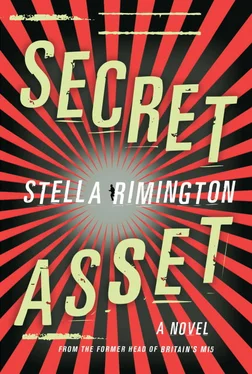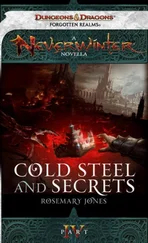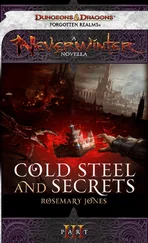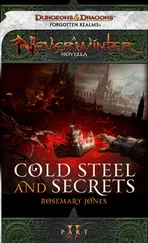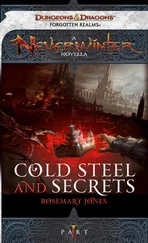Liz stood stock-still on the pavement outside High Street Kensington Underground Station, as shoppers moved nimbly around her pensive figure. Was that the object of Tom’s animus then? The British—his own people? What had he said to Margarita—a country “built on power and hypocrisy”? And he’d been serious. Deadly serious.
How stupid I’ve been, thought Liz. She had persisted in trying to discover Tom’s attachments—hoping that would lead her to the place he would go to when all else had failed.
Don’t try and track him there, thought Liz—that way leads nowhere. There was only one trail to follow, she told herself. Follow the hate.
Peggy Kinsolving had enlarged a map of the Home Counties and it sat in front of them on the conference-room table. Wetherby had looked in twice already, and now he came in and sat down. He did not look as though he would be leaving. Liz could tell that he was trying to look upbeat, but she sensed his agitated concern, since she shared it.
She was glad he was there, though, because all afternoon an idea had been brewing in her mind—far-fetched perhaps, but it wouldn’t go away. She was counting on Wetherby to decide if she were being foolish or inspired.
Outside a long spiral of black cloud was moving in from the west, and the wind had picked up, whipping at the leaves on the plane trees along the pavement across the street. Liz thought for a moment of the garden centre at Bowerbridge. This was just the sort of weather her mother hated because of the damage it caused the young plants. Then Liz felt guilty for not ringing her the night before. Her mother’s surgery was in ten days, and Liz had tried to be in touch every day.
She looked across the table at Dave Armstrong, back from Wolverhampton and reporting on what he’d found there. “Bashir bought this van a few days after he bought the Golf. The only problem is that there are probably 200,000 of them on the road. It’s like a vocational badge: you can’t call yourself a builder if you don’t own a white van.”
“What about plates?” asked Liz.
“I circulated the licence numbers right away. There are 8,000 number-plate recognition cameras in the UK, so if he’s driving with those licence plates they’ll get picked up by a camera at some point. But I’m sure he would have changed them—he did on the Golf. Quite cleverly, he kept the T-reg, because it fitted the year of the car, but he changed the number.”
Wetherby spoke up, sounding tired. His voice was low. “They’ll probably keep the van locked up anyway until they need it. That suggests that unless they’ve got yet another car, they’re staying in a town, some place with public transport in case they need to go anywhere.”
Liz looked at the Xs marked on the map in biro. “London,” she announced, then pointed slightly west, “then Wokingham.” She moved her hand up, west and north, and jabbed at another spot. “And most recently, up on the Downs near The Ridgeway.”
“What’s near there?” asked Wetherby. “Wantage?”
Liz shook her head. “I don’t think that could be the target. It’s a market town. No military installation. And Peggy’s checked for public events.”
“Every Saturday there’s a market in the square,” said Peggy, “but not much else.”
“Doesn’t seem likely,” said Wetherby. He pointed at the map. “What about Newbury?”
“There’s a country fair this weekend,” said Peggy, and Wetherby smiled but shook his head.
“Swindon?” asked Dave. “HQ of W. H. Smith and the National Trust.” This time Wetherby didn’t bother to smile.
“How about Didcot?” asked Peggy, who had discussed all these towns with Liz before the two men arrived. She pointed a few miles east from the dumped car’s position on the map. “It’s a bigger town than I realised. Its population is 25,000 and growing fast. There are enough Asians for our suspects to blend in. And most important, it’s got the power station.”
“Nuclear?” asked Dave.
“No, coal fired, though people often think it is nuclear because it’s near Harwell. Those cooling towers would be quite a target.” She looked at her notes. “Its main chimney is 650 feet high, and the six towers are each 325 feet high. You can see them from miles away. It was voted Britain’s Third Worst Eyesore by the readers of Country Life .”
“Makes me think better of the place,” scoffed Dave, who was not a Country Life reader, being strictly Old Labour.
“Hold on,” said Charles. “If they’re down there, shouldn’t we be worrying about Aldermaston? That’s where the nuclear bombs are made.”
“But you’d never get near a place like that,” said Dave. “It must be as well protected as anywhere in Britain. And how would they know what to attack without inside information? There’s no reason to think Tom has any.”
“We’d better get on to Protective Security,” said Wetherby without enthusiasm. “What do you think, Liz?” He seemed to sense her scepticism.
“I can see them staying in Didcot—it’s such an anonymous place, really just a train junction that’s grown. Much better for them than the countryside. As Asians, they’d stick out too much.
“But I can’t really see Didcot power station or Aldermaston as the target. Why would Tom think it important to blow up a power station or a nuclear-bomb factory? There’s no symbolic value in it. And anyway, you’d need a much bigger operation than he seems to have.”
“That’s all very well,” said Wetherby, “but would symbolism matter to the terrorists? They’d be after maximum impact, surely.”
“But symbolism would be important to Tom, I’m sure. If he’s doing this lunatic thing, there’s got to be some reason.”
“You’re confident then that Tom is leading these men and not just helping them?”
“Yes,” said Liz firmly, thinking of what she’d learned about him in the last two days. “Tom likes to control things, even if it’s behind the scenes. Everything Margarita Levy said confirms that. This is a mission of some sort, and he’s leading it. In his mind there’s a reason for it.”
“Do you think he’s working with Al Qaeda?” Dave asked.
“No. I think he recruited Bashir on his own account in Pakistan. He had plenty of unsupervised access to him—he was meant to be recruiting him for Six.”
Wetherby tapped the end of his pencil on the table. “All right, if not Didcot or Aldermaston, then where?” There was a hint of impatience in his voice. “We’ve got to take some decisions. Which targets are we going to cover? I have a feeling that we haven’t got much time,” he added. “They’re panicking—look at the car. Burning it suggests to me that they are on the verge of doing whatever they’re planning to do.”
He stared at Liz as if somehow she might hold the answer, and seemed grateful when she spoke up.
“I think it’s Oxford,” she said.
“Oxford? Why Oxford? Do you have any particular reason?”
“No single overpowering one,” she admitted. “But it began with something Margarita said. He hated Oxford, she said, really loathed the place.”
“Well, if it’s Oxford, what’s the target?” asked Wetherby. “His college? Or a person or some event?”
“We just don’t know. Peggy’s been trying to find out if something special’s going on there.”
“I’ll try again,” Peggy said. “I haven’t alerted the police yet since we’re so unsure. I got on to the secretary in the Registrar’s office, but she’s been out all afternoon.” She got up and left the room in a hurry.
They sat silently for a minute, Wetherby drumming his fingers on the table, lost in thought, while Dave slumped in his chair and stared at the floor.
Читать дальше
